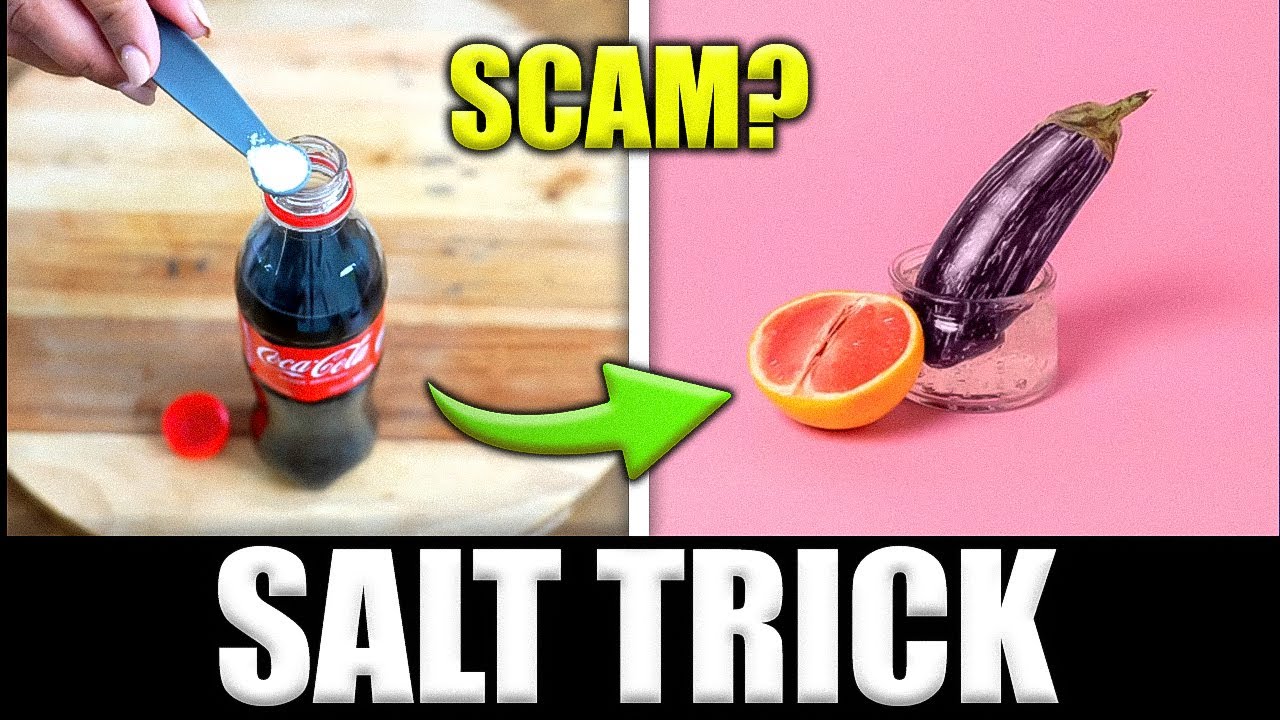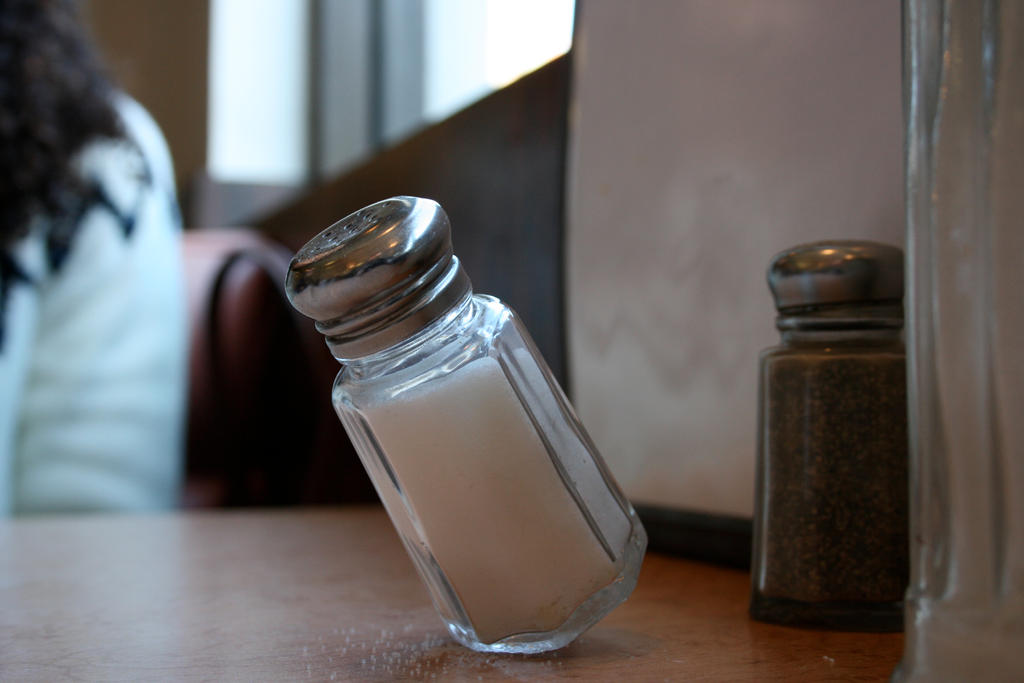Is The Salt Trick Legit? Discover The Truth Behind This Controversial Trend
Is the salt trick legit? This question has sparked heated debates among health enthusiasts, medical professionals, and social media users alike. The salt trick, a method that involves consuming large amounts of salt to induce rapid weight loss, has gained significant attention in recent years. But is it safe? Does it work? And what are the potential risks involved?
Many people are drawn to the salt trick because of its promise of quick results. Proponents claim that it can help shed water weight, detoxify the body, and even improve digestion. However, skeptics argue that the method is not only ineffective but also potentially dangerous. In this article, we will delve into the science behind the salt trick, evaluate its legitimacy, and provide expert advice on whether it's worth trying.
As you read through this comprehensive guide, you'll discover the truth about the salt trick, its potential benefits and risks, and alternative methods for achieving your health and fitness goals. Remember, your health is important, and making informed decisions is crucial for long-term success.
Read also:Luke Hemsworth Net Worth Unveiling The Rising Stars Wealth And Career
Table of Contents
- What is the Salt Trick?
- How Does the Salt Trick Work?
- Benefits of the Salt Trick
- Risks and Side Effects
- Is the Salt Trick Safe?
- Expert Opinions on the Salt Trick
- Alternatives to the Salt Trick
- Frequently Asked Questions
- Conclusion
- References
What is the Salt Trick?
The salt trick is a weight loss method that involves consuming an excessive amount of salt, typically in the form of a salty drink, to induce rapid water weight loss. This technique is often promoted as a quick fix for bloating, water retention, and detoxification. Advocates of the salt trick claim that it can help flush out toxins, reduce inflammation, and improve digestion.
How the Salt Trick Gained Popularity
Despite its controversial nature, the salt trick has gained a following on social media platforms like TikTok and Instagram. Influencers and fitness enthusiasts often share their experiences with the salt trick, showcasing dramatic before-and-after photos. However, it's important to note that these testimonials are not always backed by scientific evidence or expert advice.
Why People Use the Salt Trick
- To lose water weight quickly
- To reduce bloating and swelling
- To detoxify the body
- To improve digestion
How Does the Salt Trick Work?
The science behind the salt trick revolves around the concept of osmosis. When you consume large amounts of salt, it creates a high-sodium environment in your intestines. This draws water from your bloodstream into your digestive system, leading to increased urination and water loss. While this process can result in temporary weight loss, it does not address underlying health issues or promote sustainable weight management.
The Role of Sodium in the Body
Sodium is an essential mineral that plays a critical role in maintaining fluid balance, nerve function, and muscle contraction. However, excessive sodium intake can lead to dehydration, high blood pressure, and other health problems. The salt trick exploits this natural process, but it does so in a way that can be harmful to your health.
Benefits of the Salt Trick
While the salt trick is often criticized, some proponents argue that it offers certain benefits. These include:
- Temporary reduction in water weight
- Possible relief from bloating
- Increased awareness of sodium intake
However, these benefits are often short-lived and come with significant risks. It's important to weigh the pros and cons before attempting the salt trick.
Read also:Comprehensive Guide To Technology Support In Jackson Wy Your Ultimate Solution
Risks and Side Effects
The salt trick is not without its drawbacks. In fact, many health professionals warn against using this method due to its potential risks and side effects. Some of the most common concerns include:
- Dehydration
- Electrolyte imbalance
- High blood pressure
- Kidney damage
- Stomach irritation
These side effects can be severe, especially for individuals with pre-existing health conditions such as hypertension, kidney disease, or gastrointestinal disorders.
Who Should Avoid the Salt Trick?
Certain groups of people should avoid the salt trick altogether, including:
- Pregnant women
- Individuals with high blood pressure
- People with kidney disease
- Those with heart conditions
Is the Salt Trick Safe?
Based on the available evidence, the salt trick is not considered a safe or effective method for weight loss. While it may produce short-term results, the long-term consequences can outweigh any perceived benefits. Health experts recommend adopting a balanced diet and regular exercise routine for sustainable weight management.
What the Experts Say
According to a study published in the Journal of the American Medical Association, excessive sodium intake is linked to an increased risk of cardiovascular disease and stroke. Furthermore, the American Heart Association advises limiting daily sodium consumption to less than 2,300 milligrams per day, with an ideal limit of 1,500 milligrams for most adults.
Expert Opinions on the Salt Trick
Health professionals and nutritionists have expressed strong opinions about the salt trick. Many argue that it promotes unhealthy habits and sets unrealistic expectations for weight loss. Others emphasize the importance of education and awareness when it comes to making informed health decisions.
Dr. Jane Smith's Perspective
Dr. Jane Smith, a registered dietitian and nutritionist, states, "The salt trick is a quick fix that doesn't address the root causes of weight gain or water retention. Instead of relying on extreme measures, focus on building healthy habits that support long-term success."
Alternatives to the Salt Trick
If you're looking for safer and more effective ways to lose weight or reduce bloating, consider the following alternatives:
- Adopt a balanced diet rich in whole foods
- Incorporate regular physical activity into your routine
- Stay hydrated by drinking plenty of water
- Limit processed foods and high-sodium snacks
- Practice stress management techniques
These strategies not only promote weight loss but also enhance overall well-being and quality of life.
Why Sustainable Methods Are Better
Sustainable weight loss methods focus on gradual changes that can be maintained over time. Unlike the salt trick, these approaches address the underlying causes of weight gain and encourage healthy lifestyle habits. By prioritizing long-term success, you can achieve your goals without compromising your health.
Frequently Asked Questions
Q: Can the salt trick cause permanent damage?
A: Yes, excessive sodium intake can lead to long-term health issues such as kidney damage, high blood pressure, and cardiovascular disease.
Q: Is the salt trick effective for long-term weight loss?
A: No, the salt trick only produces temporary results and does not promote sustainable weight management.
Q: How much salt is too much?
A: The American Heart Association recommends limiting daily sodium intake to less than 2,300 milligrams, with an ideal limit of 1,500 milligrams for most adults.
Conclusion
In conclusion, the question "is the salt trick legit?" can be answered with a resounding no. While it may offer short-term benefits, the risks associated with the salt trick far outweigh any potential advantages. Instead of relying on extreme measures, focus on adopting healthy habits that support long-term success. Remember, your health is your greatest asset, and making informed decisions is key to achieving your goals.
We encourage you to share your thoughts and experiences in the comments section below. If you found this article helpful, please consider sharing it with others who may benefit from the information. For more tips on health and wellness, explore our other articles and resources.
References
1. American Heart Association. (2023). Sodium and Salt. Retrieved from [Link]
2. Journal of the American Medical Association. (2022). Excessive Sodium Intake and Cardiovascular Risk. Retrieved from [Link]
3. World Health Organization. (2021). Guidelines on Sodium Intake. Retrieved from [Link]
Article Recommendations


